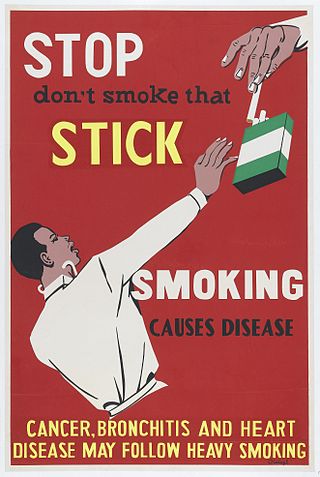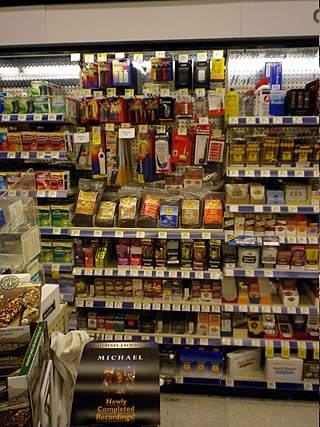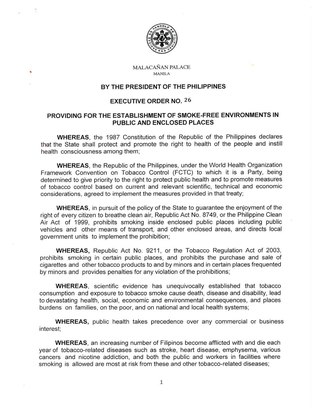
Smoking bans, or smoke-free laws, are public policies, including criminal laws and occupational safety and health regulations, that prohibit tobacco smoking in certain spaces. The spaces most commonly affected by smoking bans are indoor workplaces and buildings open to the public such as restaurants, bars, office buildings, schools, retail stores, hospitals, libraries, transport facilities, and government buildings, in addition to public transport vehicles such as aircraft, buses, watercraft, and trains. However, laws may also prohibit smoking in outdoor areas such as parks, beaches, pedestrian plazas, college and hospital campuses, and within a certain distance from the entrance to a building, and in some cases, private vehicles and multi-unit residences.

Smokeasy is a term which came briefly into use in the wake of government-imposed smoking bans in businesses. It refers to bars and other venues that encourage evasion of the ban. The term has also been used to describe locations and events promoted by tobacco companies to avoid or evade bans on smoking. The word was added to the New Oxford American Dictionary in 2005, although it was used as early as 1978. It is a portmanteau of smoking and speakeasy. As smoking bans have become generally accepted, the term has fallen into disuse.

The New Jersey Smoke-Free Air Act is a comprehensive smoking ban that took effect in New Jersey on April 15, 2006. The law prohibits smoking in most workplaces as well as in indoor public areas. The Act has been amended a number of times including in 2009 to extend the ban to electronic smoking devices and in 2018 to extend the ban to public parks and beaches. A notable exception to the smoking ban is in casinos, but legislation to remove this exception is currently pending in the New Jersey Legislature. The New Jersey Smoke-Free Air Act also allows municipalities to enact their own restrictions on smoking.

The Smoking Ordinance is a law in Hong Kong enacted in 1982 for smoking bans and regulation of sales of tobacco products. It has been amended several times ever since and the latest substantial amendment, known as the Smoking (Amendment) Ordinance 2006, was passed by the Legislative Council on 19 October 2006, and gazetted on 27 October 2006.

Tobacco smoking has serious negative effects on the body. A wide variety of diseases and medical phenomena affect the sexes differently, and the same holds true for the effects of tobacco. Since the proliferation of tobacco, many cultures have viewed smoking as a masculine vice, and as such the majority of research into the specific differences between men and women with regards to the effects of tobacco have only been studied in-depth in recent years.
Smoking in China is prevalent, as the People's Republic of China is the world's largest consumer and producer of tobacco. As of 2022, there are around 300 million Chinese smokers, and 2.4 trillion cigarettes are sold there every year, 46% of the world total.

Social customs and laws concerning drinking alcohol in public vary significantly around the world. "Public" in this context refers to outdoor spaces such as roads, walkways or parks, or in a moving vehicle. Drinking in bars, restaurants, stadiums, and other such establishments, for example, is not generally considered to be "in public" even though those establishments are open to the general public.

Tobacco smoking in Hong Kong has declined in recent decades, with 10 percent of Hong Kongers smoking on a daily basis as of 2017. It is the policy of the Hong Kong government to discourage smoking. Smoking is banned in most public places and tobacco advertising is prohibited.
About a quarter of adults in Turkey smoke. Smoking in Turkey is banned in government offices, workplaces, bars, restaurants, cafés, shopping malls, schools, hospitals, and all forms of public transport, including trains, taxis and ferries. Turkey's smoking ban includes provisions for violators, where anyone caught smoking in a designated smoke-free area faces a fine of 188 Turkish lira (~€9.29/$9.90/£8.22) and bar owners who fail to enforce the ban could be fined from 560 liras for a first offence up to 5,600 liras. The laws are enforced by the Ministry of Agriculture and Forestry of Turkey.

SmokinginCanada is banned in indoor public spaces, public transit facilities and workplaces, by all territories and provinces, and by the federal government. As of 2010, legislation banning smoking within each of these jurisdictions is mostly consistent, despite the separate development of legislation by each jurisdiction. Notable variations between the jurisdictions include: whether, and in what circumstances ventilated smoking rooms are permitted; whether, and up to what distance away from a building is smoking banned outside of a building; and, whether smoking is banned in private vehicles occupied by children.

Smoking in Nigeria is prohibited in public places. It is punishable by a fine of not less than 50,000 nor exceeding 100,000.00 naira, or by imprisonment to a term of not less than 10 years or your lifetime, or by both a fine and imprisonment.
Smoking in Ireland is banned fully in the general workplace, enclosed public places, restaurants, bars, education facilities, healthcare facilities and public transport. However, it is permitted in designated hotel rooms and there is no ban in residential care, prisons and in outdoor areas. Public opinion is in favour of the bans on smoking which are in place in Ireland.

A tobacco-free pharmacy is a retail pharmacy where the sale of tobacco products is not available. Outside the United States, it is illegal in countries such as in France and most of Canada for pharmacy stores to sell cigarettes and similar products on the same premises as over-the-counter drugs and prescription medication. Anti-tobacco campaigners advocate the removal of tobacco from pharmacies due to the health risks associated with smoking and the apparent contradiction of selling cigarettes alongside smoking cessation products and asthma medication. Some pharmaceutical retailers counter this argument by reasoning that by selling tobacco, they are more readily able to offer to customers advice and products for quitting smoking.

Smoking in India is one of the oldest industries and provides employment to more than five million people directly and indirectly. India is the second-largest producer of tobacco in the world. Smoking has been known since at least 2000 BC when cannabis was smoked and is first mentioned in the Atharvaveda. Fumigation (dhupa) and fire offerings (homa) are prescribed in the Ayurveda for medical purposes and have been practiced for at least 3,000 years while smoking, dhumrapana has been practiced for at least 2,000 years. Tobacco was introduced to India in the 17th century. It later merged with existing practices of smoking.
Tobacco 21 is a campaign to prevent youth tobacco use in the United States, primarily through laws that raise the minimum legal age to purchase tobacco and nicotine in the United States to 21. It also refers to various federal, state, and local laws based on Tobacco 21's model policy, raising the minimum sales age to 21.

Executive Order No. 26, entitled Providing for the Establishment of Smoke-Free Environments in Public and Enclosed Places, was issued by Philippine President Rodrigo Duterte on May 16, 2017. This executive order invoked the Clean Air Act of 1999 and the Tobacco Regulation Act of 2003 to impose a nationwide ban on smoking in all public places in the Philippines. The ban replicates on a national level an existing ordinance in Davao City that Duterte created as mayor in 2002. The order took effect on July 23, 2017, 60 days after its publication in a newspaper.

In the United States, individual states have primary jurisdiction in matters of public morality. The topfreedom movement has claimed success in a few instances in persuading some state and federal courts to overturn some state laws on the basis of sex discrimination or equal protection, arguing that a woman should be free to expose her chest in any context in which a man can expose his. Other successful cases have been on the basis of freedom of expression in protest, or simply that exposure of breasts is not indecent.













